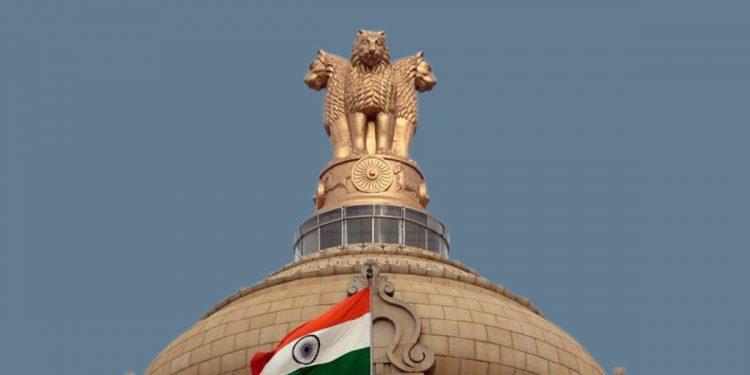Losing Our Agency, One Bill at a Time

Till a decade back, our prime concerns as citizens of a developing country used to be limited to procuring a good education and thereafter securing a decent job. Suddenly, the concerns of the general public have apparently taken a complete shift in terms of priority, which is akin to taking a drop in the Maslow’s pyramid of needs, writes RASHMI SINGH.
———
Indians, of late, are visibly more apprehensive about the dietary preferences, inter-religious marriages, and the number of children of others. Though it may seem absurd that at a time when the country is grappling with a deadly pandemic which has led to large scale unemployment and a plummeting economy, what somebody is eating or who somebody is marrying should hold any kind of mind-space for people, that is indeed, sadly, the harsh reality of the country today.
This new prioritisation of national concerns has served as fodder for the passage of legislation that have a tendency of interfering with and to an extent, even violating the most basic and fundamental rights, nay the basic human rights, that we are entitled to.
We look at four such recent legislations.
The Assam Cattle Preservation Bill, 2021
The Assam Assembly passed the Assam Cattle Preservation Bill, 2021 on August 13, 2021 amidst protests by opposition parties for the refusal of the state government to refer the Bill to a Select Committee for vetting.
The Bill seeks to replace the Assam Cattle Preservation Act, 1950, that allows the slaughter of cattle above 14 years of age or those that have become permanently incapacitated due to work, breeding, accident or deformity after local veterinary officers certify that they are fit for slaughter. The Bill retains this provision while intending to regulate the slaughter, consumption and illegal transportation of cattle across Assam.
The key features of the Bill, relevant for the purposes of this article, include:
- Prohibition on slaughter of cow, calf and heifer;
- Prohibition of transportation of cattle from or through Assam;
- Prohibition of sale of beef or beef products in areas predominantly inhabited by Hindus, Jains, Sikhs, and other non-beef eating communities;
- Prohibition of sale of beef or beef products within a 5 km radius of any temple, satra or other Hindu religious institution.
The punishment for violation of the above provisions is imprisonment for a term not less than three years and up to eight years, or a fine between INR 3 lakhs and 5 lakhs or both.
Leaving aside the deep communal divide that will flow from the Bill, the bare perusal of its provisions shows that they can be subjected to grave misuse and abuse by executive authorities. For instance, the Bill fails to define what constitutes an area that is “predominantly inhabited by Hindu, Jain, Sikh and other non-beef eating communities”, especially when one takes into consideration the fact that there might be areas where the ratio of “beef-eaters” and “non-beef eaters” is almost the same.
According to the 2011 census, Muslims accounted for 34.22% of the State’s total population while Christians formed 3.47%., again pointing to the sheer impracticality of the provisions of Bill.
Another profound worry that the Bill causes, by implication, is that it takes away the agency of, and interferes with the eating choices of, people of all communities. What a person chooses to eat is a very personal choice that any individual living in a secular democracy is entitled to make.
In 2017, in the laudable judgment of Saeed Ahmad versus State of Uttar Pradesh, a division bench of the Allahabad High Court held that food, food habits and vending thereof are undisputedly connected with the right to life and livelihood guaranteed under Article 21 of the Constitution of India. The Court further observed that the foodstuffs a person may desire to consume is his private choice.
Regrettably, the aforementioned judgment was disregarded by a single judge of the same High Court in a bail order dated September 1, 2021 passed in Javed versus State of Uttar Pradesh, holding that eating/consuming cow-beef cannot be considered to be a fundamental right of any person.
Also Read: Country’s welfare depends on the cow; its protection should be a Fundamental Right: Allahabad HC
In any case, and irrespective of contradictory judgments, one can conclude that the Bill, with its stringent punishments and reversal of burden of proof so as to render a person guilty until proved innocent, will result in the stoking of communal tensions and in the ostracization of people who choose to consume beef.
Uttar Pradesh Prohibition of Unlawful Conversion of Religion Bill, 2021
The Uttar Pradesh Prohibition of Unlawful Religious Conversion Bill, 2021, first promulgated as an ordinance, was passed on February 24, 2021 by the state legislative assembly by a voice vote.
It is no secret that our society in general frowns upon inter-faith and even inter-caste marriages, the result of which varies from couples being ostracized to them being made victims of “honour-killings”.
That being the position, a legislation that brings in more impediments in the way of people wishing to marry a person of another religion will lead to people being forced to refrain from inter-faith marriages, thereby interfering with a very personal choice.
The few who will be brave enough to enter into an inter-faith marriage will not only bear the brunt of being detested by the society, but will also have to deal with a rigid system under which a person who desires to convert has to give a declaration at least 60 days in advance, while the person who performs the conversion ceremony has to give one month’s advance notice.
One of the key features of this Bill is that it prohibits conversion of religion through force, misrepresentation, undue influence, allurement or fraud or marriage. The term “allurement” is defined to mean and include “offer of any temptation in the form of:
- Any gift, gratification, easy money or material benefit either in cash or kind;
- Employment, free education in reputed school run by any religious body; or
- Better lifestyle, divine displeasure or otherwise.”
Such a broad definition of the term “allurement” opens the gates for exploitation and abuse. It could lead to situations where, for example, the person choosing to convert, say for marriage, finds it hard to convince the authorities of the same being a voluntary decision when ten members of the person’s family testify that she is being coerced into it.
Gujarat Freedom of Religion (Amendment) Act, 2021
The provisions of another state legislation, the Gujarat Freedom of Religion (Amendment) Act, 2021 that has also been enacted on similar lines, were recently challenged before the Gujarat High Court, which then passed an interim order on August 19, 2021 directing that the provisions of the said Act would not apply to inter-faith marriages which take place without force, allurement or fraudulent means.
In the said order, the High Court relied upon the Supreme Court’s judgment in Shafin Jahan versus Ashokan (2018) wherein the Supreme Court had observed as follows:
“The right to marry a person of one’s choice is integral to Article 21 of the Constitution. The Constitution guarantees the right to life. This right cannot be taken away except through a law which is substantively and procedurally fair, just and reasonable. Intrinsic to the liberty which the Constitution guarantees as a fundamental right is the ability of each individual to take decisions on matters central to the pursuit of happiness. Matters of belief and faith, including whether to believe are at the core of constitutional liberty. The Constitution exists for believers as well as for agnostics. The Constitution protects the ability of each individual to pursue a way of life or faith to which she or he seeks to adhere. Matters of dress and of food, of ideas and ideologies, of love and partnership are within the central aspects of identity. The law may regulate (subject to constitutional compliance) the conditions of a valid marriage, as it may regulate the situations in which a marital tie can be ended or annulled. These remedies are available to parties to a marriage for it is they who decide best on whether they should accept each other into a marital tie or continue in that relationship. Society has no role to play in determining our choice of partners.” (Emphasis Supplied)
Also Read: Gujarat Anti-Conversion Law Takes Hit: Are UP, MP Next?
The very fact that the State deems it appropriate to interfere with such personal choices that people are entitled to make under the Constitution of India, in itself amounts to demeaning and belittling the agency of the people.
Uttar Pradesh Population (Control, Stabilisation and Welfare) Bill, 2021:
The Uttar Pradesh Population (Control, Stabilisation and Welfare) Bill, 2021 was released by the Law Commission of Uttar Pradesh on July 11, 2021, with the aim to, inter alia, reduce the State’s fertility rate to 2.1 per thousand by 2026 and 1.9 per thousand by 2030.
Although, on the face of it, this legislation may appear to be a genuine attempt to contain the population growth of the most densely populated state in the country, in reality, it translates to adverse ramifications for women and their reproductive rights.
An incentive-disincentive approach has been adopted by this Bill to achieve the above goal. It proposes barring people with more than two children from contesting local body elections, applying for Government jobs, seeking promotions in Government services or subsidy benefits. Strangely, the Bill also proposes restricting the maximum number of children a couple can adopt.
Time and again, research has shown that population control policies often result in unfortunate consequences such as female foeticide, unsafe abortions that lead to poor health or death of women, and taking away of the women’s agency over her body. It is pertinent to remember that India has one of the highest rate of female foeticide in the world.
Also Read: Why Two-Child Policy is Futile for Population Control
According to Alaka Basu, a sociologist, demographer and professor of development sociology at Cornell University, the Bill could have adverse impacts such as, “… negative possibilities like a rise in sex-selective abortions, unwanted interventions on women’s bodies, and selective targeting of groups.”
Again, leaving aside the communal angle that the Bill apparently seeks to propagate by ensuring a “population balance between communities”, the Bill seriously undermines the right of a person to adopt and seems oblivious to the already negligible say that women have in terms of family planning.
Women continue to bear the burden of family planning in India, with female sterilisation constituting 75% of modern contraceptive methods used. The share of condoms is approximately 12% and male sterilisation 0.6%. Societal pressures and myths lead to fewer men sharing the responsibility for planned families.
As a result of the patriarchal structure of our society, if women lack control over their own fertility decisions, they become collateral damage in the event of a coercive population policy such as this Bill.
A woman’s body is hers alone. Needless to say, she deserves to have the sole decision-making power over questions like how many children she wants and when she wants them. The woman herself is the one who knows when she is ready, both physically as well as emotionally, to bear, give birth to and care for her child. She must be empowered to make such decisions through being educated on contraception and family-planning.
The inexplicable restriction on adoption flies in the face of the Bombay High Court’s judgment in In the matter of adoption of Payal @ Sharinee Vinayak Pathak (2009), in which adoption has been recognised as a facet of the right to life under Article 21 of the Indian Constitution. The High Court held that the right to live that is asserted is, on the one hand, the right of parents and of individuals, women and men, who seek to adopt a child to give meaning and content to their lives. Also, the right to life that is specially protected is the right of children who are in need of special care and protection.
Adopting a child in need of care and protection is a noble act and needs to be encouraged by the State. This Bill, on the other hand, imposes restrictions on the same that seem completely unjustified and unreasonable even when looked at in terms of the objective that this Bill seeks to achieve.
Also read: Second Wave Ruins Families and Orphans Children in Punjab
When a person of sound mind attains the age of majority (that is, 18 years), she is free to exercise her right to vote, to buy property, to enter into agreements, and so on and so forth. In other words, an adult can be trusted to have the required wisdom and prudence to successfully exercise the rights available to her, including who should or should not be part of the ruling Government.
In this context, a person can certainly be trusted with the decisions such as the kind of food she wants to consume, the kind of religion she wants to practice and most importantly, the person she wishes to marry.
This is not a mere imposition of checks on the freedom to eat as one chooses or to marry as one likes, but a garbed attempt to impose values and beliefs on people who may not necessarily share them. Freedom to be able to exercise agency culminates into leading a desired life.
One must remember that human will is an integral part of human dignity, and to be forced to do something against our will demeans the human spirit.
“Better to starve free than be a fat slave.” – Aesop
(Rashmi Singh is a Delhi-based lawyer. The views expressed are personal.)
Get the latest reports & analysis with people's perspective on Protests, movements & deep analytical videos, discussions of the current affairs in your Telegram app. Subscribe to NewsClick's Telegram channel & get Real-Time updates on stories, as they get published on our website.
















